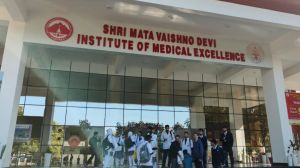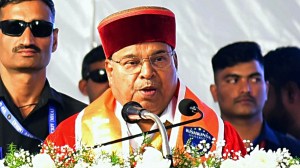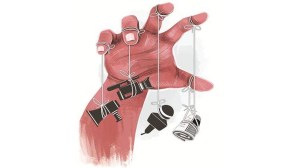Branding our IITs
By all accounts, the Indian Institutes of Technology never had it so good. Due to the generosity of a fatherly government, they are all flus...

By all accounts, the Indian Institutes of Technology never had it so good. Due to the generosity of a fatherly government, they are all flush with funds, much more than they can handle. The prime minister himself has announced that their number will be doubled. Professors from the IITs have been handpicked to run most of the National Institutes of Technology that form the next tier of technical education. The selection of all engineering students will henceforth be with a single entrance examination, which will naturally be managed by the IITs. In effect, IITs will henceforth have considerable influence on technical education in the country. As a further measure, senior officials of the HRD Ministry now sit on the boards of the IITs to smoothen out any organisational problems they may face.
However, just as too little food is not good for the body, too much is not good either. There is a famous anecdote about Lord Rutherford, one of the most reputed physicists of the 20th century, telling his colleagues, 8220;There is going to be a shortage of funds, hence we must think more.8221; As the saying goes, necessity is the mother of invention. Hence, too much money will not force the faculty of the IITs either to think more or invent better.
There is a naive belief that given the name and the money, any engineering college will become an IIT. The IITs have become what they are, and what virtually no Indian university has not, because of three features. One, they were not micromanaged from outside and enjoyed instead effective autonomy in academic and administrative matters. Two, they were hybrids with substantial academic and cultural inputs from globally reputed institutions. Three, they pursued global technology, did not confine themselves to local problems.
Educational institutions need three kinds of freedom: the freedom to choose what to teach, who will teach and whom to teach. In spite of severe political constraints faced by it, the government has so far been generous enough to accord these freedoms to the IITs in considerable measure.
However, with officials from the HRD Ministry sitting on the boards of governors, the situation will change sooner or later. There are no doubt advantages in having direct access to decision makers in the ministry. In the beginning, they will enter with the best of intentions to guard and protect the IITs. However, whenever a conflict arises between the interests of the IITs and of the government, such officials will, as a matter of necessity, guard the interests of the government and not of the IITs. They are the watchdogs of the government, not watchdogs for the IITs.
When matters go wrong, as they will surely do sometime or other, the tendency will be to help set matters right, and not let the IITs find solutions on their own. Good scholars keep their distance from royalty; they will accept patronage but preserve jealously the freedom to do what they think best in the interests of scholarship, even if it does not accord with the wishes of the rulers.
For instance, forty years ago, when transistors first came into vogue, I introduced their study in IIT Delhi, replacing the study of valves that were the prevailing technology. One teacher, with long years of experience in an engineering college, vehemently opposed the change on the ground that over 90 per cent of the electronic equipment in use in the country used valves and not transistors. He went on to argue that by dropping the study of valves, IIT graduates would lose in the job market.
Here is a typical academic controversy. I decided that IIT should teach at the frontiers of global technology irrespective of what the Indian state of industry may be. I could do so because I enjoyed academic autonomy. It is a boast of IITs that their syllabi are ever changing, are as modern as they can be. That is why IITs are respected the world over. IITs pursue knowledge, not Indian industry. The moment they tie themselves to local demands they will lose their global reputation. Such is the culture of the IITs that the teacher who opposed the introduction of transistors later on wrote a textbook on the same field!
However, this luxury can be enjoyed only by a few. The country needs only a few institutions that think of tomorrow more than of today. That is one reason why a common entrance test for all engineering admissions in the country is not a good idea at all. A test that is valid for an IIT type of education will not be valid for others where the aim is to maintain existing equipment and not design new ones. Here is one instance in which, with the best of intentions admittedly with the concurrence of some IIT scholars, the state has added to the power of the IITs but subtracted from their freedom to choose.
Cross-fertilisation is the innate characteristic of all high-quality institutions of higher learning. Famous universities, anywhere in the world, would not be what they are if they do not attract and patronise scholars from other cultures. The IITs are what they are because of the ideas borrowed from the foreign institutions that helped them at the time of their birth. Such cross-fertilisation should not be a one-off process, but a perennial flow. From that point of view, the rejection of the offer from IIT alumni to support research in the IITs is unfortunate.
It is true that the money that the alumni will bring is minuscule compared to what the government provides. It is true that the alumni will more often than not target their own interest rather than the national needs of India. Nevertheless, the alumni would bring fresh ideas, the kind that neither government funds nor internal developments can provide. In any case, there cannot be too many new ideas.
Gandhiji said: I do not want my house to be walled on all sides and my windows to be stuffed. I want the cultures of all the lands to be blown about my house as freely as possible. But I refuse to be blown off my feet by any. Likewise, the IITs need to keep their windows open not because they do not have enough air inside but they need to replace it with fresh air. The IITs should not be blown off their feet; neither should their feet be rooted to the ground nor to the past.
E-mail the Author
- 01
- 02
- 03
- 04
- 05































